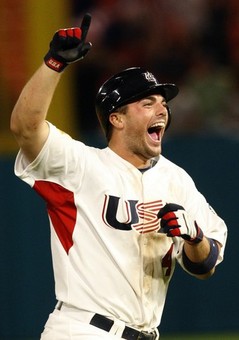I know what you're thinking; with everything going on in baseball, from Albert Pujols negotiations to Michael Young trade talks to pitchers and catchers reporting to Spring Training, why pick such a dormant topic as the WBC? Nearly two years ago, Japan took home the title in the 2009 Classic. In just over two years from now, the next champion will be crowned. But many have been critical of the tournament system. Should changes be made? Should the United States continue to host the final game? Should the current field of 16 be expanded?
The results of the 2009 tournament can be found on this page. As you can see, there was decent diversity in the first round with all four pools beginning in other countries (Tokyo, Mexico City, San Juan, and Toronto). But after that, it's all in the United States. The second round was played in Miami and San Diego, followed by the semifinals and finals played in Los Angeles. In the first round, with the teams in pools of four, two teams advance by winning three games and two teams are eliminated by losing two. Although there were plenty of exciting games, attendance was low for these games and they sometimes struggled to sell 50% of tickets. However, the final game in Los Angeles drew over 55,000 making it probably the only sellout in the entire tournament.
The round should be rotated by tournament. The locations of the rounds in 2013 haven't been announced yet, but I hope the final is in another country. Just because the WBC was our idea doesn't mean we have to control it. It would promote international baseball more in other countries because, as we can see with the first round attendance numbers, there is an unfortunate lack of interest. What if the 2013 rounds looked like this (remember, warm weather climates only in March): First round in Houston, Atlanta, Mexico City, and Guadalajara, second round in Santo Domingo and Taiwan, semifinal and final in Tokyo. Baseball may be America's 'national pastime' but that doesn't mean we like baseball more than Japan or Puerto Rico. If this tournament is to be called the 'World Baseball Classic' it should celebrate the intense baseball culture of all countries involved.
A plan set in 2009 suggested the WBC in 2013 be expanded to 24 teams. According to the International Baseball Federation's national team rankings, the eight teams that would be added would be Nicaragua, Spain, Thailand, the Philippines, Great Britain, Germany, the Czech Republic and the Netherlands Antilles. This is a great idea because the more the teams, the more baseball pride around the world. Many critics have deemed the WBC a failure to create interest in international baseball where interest lacks, but a change to the tournament format with more teams and a bracket simpler to follow would accomplish this purpose. If you look at the World Cup, first of all there are 32 teams, and second of all the points system within each pool is simple to follow. Perhaps the WBC should adopt a system where each team plays the other three in its pool, then advances or not based on a point system where a win is three points and a loss is one. After just two tournaments, I think the WBC can't be dubbed a failure or success as of yet, but 2013 could be a pivotal point for baseball's most prominent international championship.


No comments:
Post a Comment